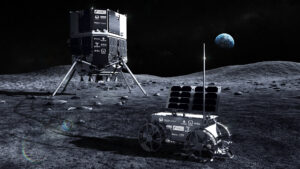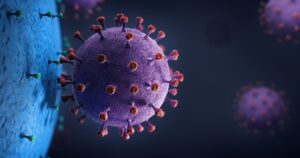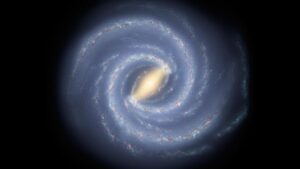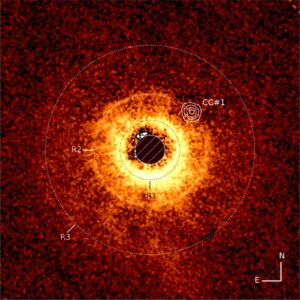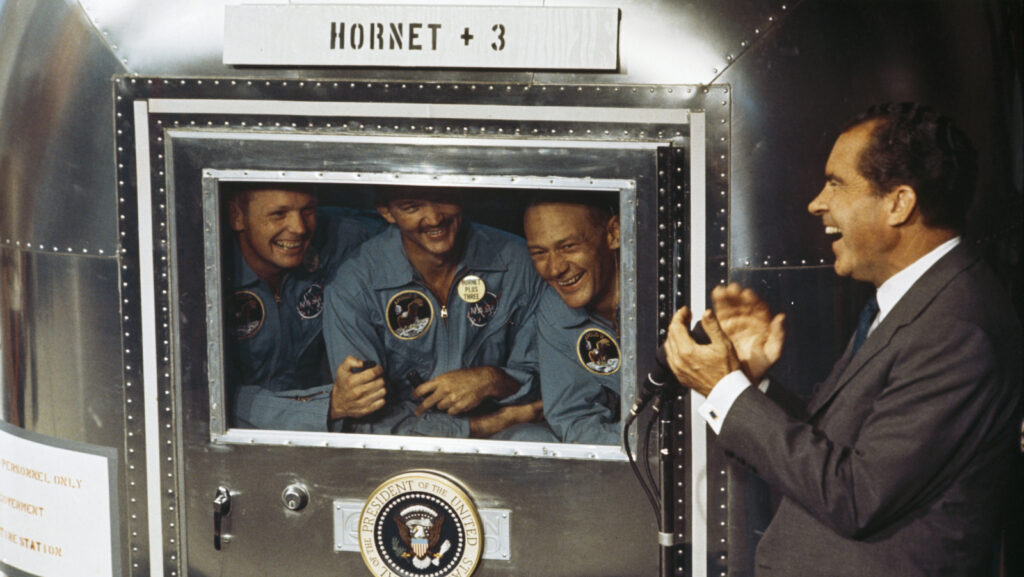
24th July 1969: From left to right, Neil Armstrong, Michael Collins and Edwin 'Buzz' Aldrin Jnr, the crew of the historic Apollo 11 moon landing mission are subjected to a period of quarantine upon their return to earth. Through the window of their Mobile Quarantine Facility, they hold a conversation with President Richard Nixon (1913 - 1994). (Photo by MPI/Getty Images)
SYDNEY – A groundbreaking study reveals moon dust poses less risk to human lungs than city air pollution.
During the historic Apollo missions, NASA took extensive precautions to prevent astronauts from bringing back potentially dangerous microorganisms from the Moon. However, a recent study conducted by the University of Technology Sydney suggests that the conditions on Earth may be more detrimental to human health in a surprising way.
Immediate Impact
The study, published last month, found that moon dust is significantly less toxic to the human pulmonary system compared to the air pollution encountered in urban environments. This discovery challenges previous assumptions about the dangers of lunar material.
According to the research, inhaling moon dust is unlikely to cause long-term damage to human airways. Tests demonstrated that lunar material did not induce significant oxidative stress to lung cells, alleviating concerns that have lingered since the uncomfortable experiences of Apollo astronauts.
Key Details Emerge
The research team, led by Michaela B. Smith, a Ph.D. student, conducted comprehensive tests on lunar regolith, the powdery substance found on the Moon’s surface. Their findings suggest that fears of moon dust toxicity may be unfounded.
“The lunar material did not trigger significant oxidative stress to lung cells,” said Michaela B. Smith, lead researcher.
Industry Response
While the study provides reassuring news for future lunar missions, experts caution against underestimating the potential risks associated with moon dust. The research highlights the need for continued investigation into the long-term effects of exposure to extraterrestrial materials.
NASA and other space agencies are likely to incorporate these findings into their safety protocols for upcoming missions to the Moon and beyond.
By the Numbers
- Moon dust toxicity: Significantly lower than urban air pollution
- Oxidative stress: Minimal impact on lung cells
- Study duration: 12 months
What Comes Next
The study’s results could influence the design of future lunar habitats and equipment, ensuring that astronauts are adequately protected from any potential harm. The timing is particularly significant as nations ramp up efforts for lunar exploration and potential colonization.
Meanwhile, industry experts warn that urban air pollution remains a pressing issue, with significant implications for public health worldwide.
Background Context
The announcement comes as space exploration agencies are intensifying their focus on the Moon, with plans for manned missions and even permanent bases. This development builds on decades of research aimed at understanding the Moon’s environment and its potential impact on human health.
Historically, the Apollo missions provided the first direct interactions with lunar material, sparking initial concerns about its effects on human health. The latest study offers a new perspective, suggesting that lunar dust may be less hazardous than previously thought.
Expert Analysis
According to sources familiar with the study, the findings represent a significant shift from previous assumptions about the dangers of lunar exploration. Experts emphasize the importance of continued research to fully understand the implications of exposure to extraterrestrial materials.
The move represents a significant shift from the cautious approach taken during the Apollo era, offering new opportunities for safe and sustainable exploration of the Moon.
As the world looks to the stars, the insights gained from this study will play a crucial role in shaping the future of space exploration and ensuring the safety of those who venture beyond Earth.

